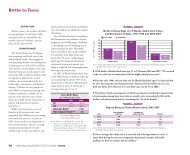2010 Rhode Island Kids Count Factbook
2010 Rhode Island Kids Count Factbook
2010 Rhode Island Kids Count Factbook
Create successful ePaper yourself
Turn your PDF publications into a flip-book with our unique Google optimized e-Paper software.
Women with Delayed Prenatal Care<br />
25<br />
20<br />
15<br />
DEFINITION<br />
Women with delayed prenatal care is<br />
the percentage of women beginning<br />
prenatal care in the second or third<br />
trimester of pregnancy or receiving no<br />
prenatal care at all. Data are reported by<br />
place of mother’s residence, not place of<br />
infant’s birth.<br />
SIGNIFICANCE<br />
Early prenatal care is important to<br />
identify and treat health problems and<br />
influence health behaviors that can<br />
compromise fetal development, infant<br />
health and maternal health. Women<br />
receiving late or no prenatal care are at<br />
increased risk of poor birth outcomes<br />
such as having babies who are stillborn,<br />
of low birthweight or who die within<br />
the first year of life. 1<br />
Prenatal care offers the opportunity<br />
to screen for and treat conditions that<br />
increase the risk for poor birth<br />
outcomes and to educate parents on<br />
caring for newborns. Effective prenatal<br />
care also screens for and intervenes with<br />
a range of maternal needs including<br />
nutritional needs, social support, mental<br />
health, smoking cessation, substance<br />
use, domestic violence, and unmet<br />
needs for food and shelter. 2,3 Prenatal<br />
visits are also the first step in<br />
establishing the infants’ medical home,<br />
and can provide valuable links to other<br />
health services. 4,5<br />
Timely initiation of prenatal care is<br />
especially important for women who<br />
face multiple risks for poor birth<br />
outcomes. Addressing barriers to<br />
prenatal care, implementing and<br />
enhancing Medicaid policies and other<br />
programs that provide health care to<br />
women of childbearing age, and<br />
renewing focus on timing and content<br />
of prenatal care are strategies to increase<br />
timely prenatal care for all women. 6<br />
In <strong>Rhode</strong> <strong>Island</strong> between 2004 and<br />
2008, 14% of women who gave birth<br />
either received no prenatal care or did<br />
not begin care until the second or third<br />
trimester, up from 9.4% between 2001<br />
and 2005. 5 Pregnant adolescents in<br />
<strong>Rhode</strong> <strong>Island</strong> are the most likely to<br />
delay prenatal care. Between 2004 and<br />
2008, over one-quarter (26.8%) of<br />
teens ages 19 and under received<br />
delayed prenatal care, compared with<br />
12.6% of women ages 20 and over. 7<br />
Late or No Prenatal Care<br />
1995 2006<br />
RI 1.3% 1.9%<br />
US 4.2% 3.6%<br />
National Rank* 3rd<br />
New England Rank** 3rd<br />
*1st is best; 32nd is worst<br />
**1st is best; 4th is worst<br />
Source: U.S. Centers for Disease Control and Prevention.<br />
(2009). Births: Final data for 2006. National Vital<br />
Statistics Reports, 57(7). This ranking is based on the<br />
32 states with comparable prenatal care data. Late or<br />
no prenatal care indicates care beginning in the 3rd<br />
trimester or not at all prior to birth.<br />
10<br />
5<br />
0<br />
25%<br />
20%<br />
15%<br />
10%<br />
5%<br />
0%<br />
Women With Delayed Prenatal Care by Race/Ethnicity,<br />
<strong>Rhode</strong> <strong>Island</strong>, 2004-2008<br />
24.2%<br />
21.6%<br />
21.4%<br />
Asian Native American Black<br />
Hispanic* White All Races<br />
Source: <strong>Rhode</strong> <strong>Island</strong> Department of Health, Center for Health Data and Analysis, Maternal and Child Database, 2004-<br />
2008. Data for 2008 are provisional. *Hispanic may be included in any racial category.<br />
◆ Between 2004 and 2008 in <strong>Rhode</strong> <strong>Island</strong>, Asian women (24.2%), Native American<br />
women (21.6%), Black women (21.4%), and Hispanic* women (19.1%) were<br />
significantly more likely to receive delayed prenatal care than White women (12.3%). 8<br />
◆ Between 2004 and 2008, the rate of delayed prenatal care in the core cities (18.2%)<br />
was nearly twice the rate in the remainder of the state (10.2%). Newport was the only<br />
core city with a rate of delayed prenatal care (11.5%) better than that of the state as a<br />
whole (14.0%). 9<br />
Reducing Barriers to Prenatal Care<br />
◆ Strategies that increase access to timely prenatal care include insurance coverage and<br />
access to preconceptual care for teens and women of childbearing age, education on<br />
preventive health practices, and access to health providers with the training and skills to<br />
be culturally and linguistically competent. 10<br />
◆ RIte Care, <strong>Rhode</strong> <strong>Island</strong>’s Medicaid managed care program, has improved access to<br />
prenatal care for women. Targeted interventions expanded the number of obstetric care<br />
providers serving Medicaid patients and improved the adequacy of prenatal care to<br />
women in the program. 11<br />
◆ Between 2004 and 2008, uninsured women in <strong>Rhode</strong> <strong>Island</strong> were more than twice<br />
aslikely to receive delayed prenatal care (44.2%) than women enrolled in RIte Care<br />
(20.4%). 12<br />
19.1%<br />
12.3%<br />
14.0%<br />
64 <strong>2010</strong> <strong>Rhode</strong> <strong>Island</strong> KIDS COUNT <strong>Factbook</strong> / Health






